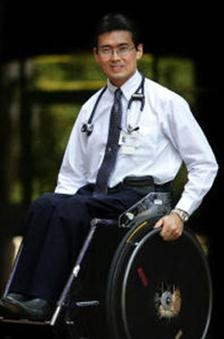When the doctor has a disability
Posted by Dr. Suzanne Koven
http://www.boston.com/lifestyle/health/blog/inpractice/2013/08/post.html (ขนาดไฟล์: 0 )
In my practice, as in most medical practices, we accommodate patients' particular needs in all kinds of ways: wheelchair accessible rooms and hallways, interpreters of virtually all languages including American Sign Language, gowns and instruments in a wide range of sizes, information sheets and videos suitable for patients with a variety of educational backgrounds.
No one questions the appropriateness of these accommodations.
But what about when the doctor or nurse requires an accommodation?
A current lawsuit involving a deaf medical student at Creighton University in Nebraska invites a reconsideration of this question.

Argenyi's suit, it seems to me, taps into broader questions about doctors' roles. Some would argue that physicians are like other workers, whose working conditions should be protected by all sorts of laws and regulations including the Americans With Disabilities Act.
Some would argue that doctors are not like other workers, that our duty to our patients supersedes all other concerns, including our own needs. This was certainly the ethos in which I was trained, long before the current restrictions on resident work hours. I remember, back then, telling a non-medical friend about the long hours I worked and her asking, "But don't you get paid lots of overtime for that?" I laughed. There was, of course, no "overtime."
I actually don't think these two views are at odds when it comes to physicians with disabilities. Couldn't the argument be made that having a deaf physician--or one with cerebral palsy, blindness, dwarfism, or any of several differences and disabilities--has the potential to enhance patient care? I know that my own experiences with such clinicians, as a teacher, colleague and (in one case) as a patient myself, have enlarged my own sense of the ways in which disabilities can be overcome and the varied forms in which excellent and compassionate care can appear.
Is is possible that having a deaf doctor has, for some patients, therapeutic benefits that equal or even outweigh any problems that disability poses?
ที่มา: http://www.boston.com/lifestyle/health/blog/inpractice/2013/08/post.html (ขนาดไฟล์: 0
)
วันที่โพสต์: 22/09/2556 เวลา 03:13:45 
![]()
![]()
แสดงความคิดเห็น
รายละเอียดกระทู้
Posted by Dr. Suzanne Koven http://www.boston.com/lifestyle/health/blog/inpractice/2013/08/post.html In my practice, as in most medical practices, we accommodate patients' particular needs in all kinds of ways: wheelchair accessible rooms and hallways, interpreters of virtually all languages including American Sign Language, gowns and instruments in a wide range of sizes, information sheets and videos suitable for patients with a variety of educational backgrounds. No one questions the appropriateness of these accommodations. But what about when the doctor or nurse requires an accommodation? A current lawsuit involving a deaf medical student at Creighton University in Nebraska invites a reconsideration of this question. When the doctor has a disabilityThe student, Michael Argenyi, is suing Creighton because they have refused to provide an interpreter for him during his interactions with patients. One of the school's arguments is that introducing a third person into the doctor/patient interaction would be intrusive. (Though this is not an argument often used against providing an interpreter for a patient). Argenyi's suit, it seems to me, taps into broader questions about doctors' roles. Some would argue that physicians are like other workers, whose working conditions should be protected by all sorts of laws and regulations including the Americans With Disabilities Act. Some would argue that doctors are not like other workers, that our duty to our patients supersedes all other concerns, including our own needs. This was certainly the ethos in which I was trained, long before the current restrictions on resident work hours. I remember, back then, telling a non-medical friend about the long hours I worked and her asking, "But don't you get paid lots of overtime for that?" I laughed. There was, of course, no "overtime." I actually don't think these two views are at odds when it comes to physicians with disabilities. Couldn't the argument be made that having a deaf physician--or one with cerebral palsy, blindness, dwarfism, or any of several differences and disabilities--has the potential to enhance patient care? I know that my own experiences with such clinicians, as a teacher, colleague and (in one case) as a patient myself, have enlarged my own sense of the ways in which disabilities can be overcome and the varied forms in which excellent and compassionate care can appear. Is is possible that having a deaf doctor has, for some patients, therapeutic benefits that equal or even outweigh any problems that disability poses?
จัดฟอร์แม็ตข้อความและมัลติมีเดีย
รายละเอียดการใส่ ลิงค์ รูปภาพ วิดีโอ เพลง (Soundcloud)

